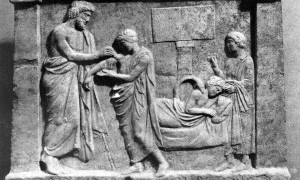I’m the chair of the team currently putting the finishing touches on the brand-new module for Part 2 of the MA in Classical Studies, and I think I speak for the whole team when I say it has been quite a journey! When we started out, we knew we had to follow up the more thematically broad-based and skills-oriented MA Part 1 with a more specific subject-based module; we settled on the topic of the human body in the ancient world, as it seemed broad enough to be able to cover a variety of themes and types of evidence, but specific enough for students to feel that they have an in-depth knowledge of the subject. It also happens to be one of the most dynamic and fast-growing areas of classics right now, with several of the field’s key scholars amongst our staff at the OU. Because of this, of course, we have all been very excited to work on this module in particular, and many of us have been able to bring our own research expertise into the teaching material, which is always fun!
In Block 3 of A864 we look at religious healing in the ancient world. This votive stele shows the healing hero Amphiaraos treating the shoulder of Archinos, who is also shown being bitten on the same shoulder by a snake whilst sleeping. Sanctuary of Amphiaros, Oropus, Attica. Marble, c.400-380 BCE. (This file comes from Wellcome Images, a website operated by Wellcome Trust, a global charitable foundation based in the United Kingdom)
Once the initial excitement subsided, however, it was clear that it wasn’t going to be the easiest module in the world to put together. What exactly did we want to get across to students? How could we choose topics that would teach students not just about the ins and outs of that topic, but what they tell us about different types of evidence, or investigation techniques, or periods of scholarship? And how were we going to manage the fact that much of our material would inevitably go very close to the bone for many of our students? Topics like disability, sexuality, birth and death can be difficult to teach because they lie at the very heart of some of the central concerns – and taboos – of human society. Rather than seeing this as a disadvantage, however, we have embraced this fact, because it means that students will be thinking about, discussing and formulating thoughts on matters that have profound significance for the way we live our lives. We think that by learning about how Greeks and Romans used and regarded their bodies, we can go some way to understanding not just the interesting things that make our societies very different, but also the commonalities that make us all human.
As the start date (3rd Oct.) looms, we are now putting together the final items of teaching material and starting to populate the module VLE. We are very much looking forward to seeing how the first year of presentation goes, and to those of you registered on the module, we hope very much that you enjoy it!
To find out more information and the latest news on the module, visit the MA in Classical Studies Facebook page at https://www.facebook.com/ClassicsMA .
Ursula Rothe on behalf of the Module Team for Part 2 of the MA in Classical Studies

It is interesting to know how people treated those who had serious physical and mental illnesses in the past. They definitely did not have all those strong medicine and antibiotics and even good surgeons like they do in the modern times. I am wondering whether this module uses textbooks.
Hi Silvia! No, there are no set books for this module. Did you want to make a head start? I can send you some reading tips if you’d like to email me ([email protected]).